| Listing 1 - 10 of 11 | << page >> |
Sort by
|
Book
ISBN: 1282985523 9786612985522 9264091459 9264091440 Year: 2010 Publisher: [Paris] : OECD,
Abstract | Keywords | Export | Availability | Bookmark
 Loading...
Loading...Choose an application
- Reference Manager
- EndNote
- RefWorks (Direct export to RefWorks)
This first volume of PISA 2009 survey results provides comparable data on 15-year-olds' performance on reading, mathematics and science across 65 countries. The volume opens with an introduction explaining what PISA is and how PISA 2009 is different from previous PISA surveys. The introduction also explains what PISA 2009 measures and how. A reader's guide provides information needed to interpret the data. Chapter 2 provides a summary of the findings related to performance in reading, the focus of the 2009 survey. Chapter 3 provides a summary of the findings related to performance in mathematics and science. A final chapter explores policy implications in five areas: low performance, pursuing excellence, strengths and weaknesses in different kinds of reading, student performance in math and science, and the potential to improve performance across the world. Annexes provide detailed statistical data and technical information.
Education --- Social Sciences --- Theory & Practice of Education --- Examinations --- Interpretation. --- Interpretation of examinations --- Test interpretation --- Test results --- Validity
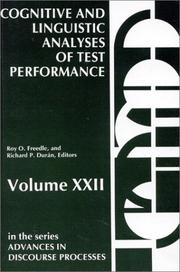
ISBN: 0893913669 Year: 1987 Volume: 22 Publisher: Norwood Ablex
Abstract | Keywords | Export | Availability | Bookmark
 Loading...
Loading...Choose an application
- Reference Manager
- EndNote
- RefWorks (Direct export to RefWorks)
Examinations --- Linguistic analysis (Linguistics) --- Cognition in children --- Evaluation --- Interpretation --- Analysis, Linguistic (Linguistics) --- Analysis (Philosophy) --- Grammar, Comparative and general --- Interpretation of examinations --- Test interpretation --- Test results --- Competitive examinations --- Tests --- Questions and answers --- Educational tests and measurements --- Cognition (Child psychology) --- Thought and thinking in children --- Child psychology --- Validity
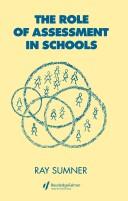
ISBN: 1135799776 0585452954 1280405333 9786610405336 0203480333 9780203480335 9780585452951 6610405336 9780700512638 0700512632 0700512632 9781135799724 9781135799762 9781135799779 9781138421462 1135799768 Year: 1991 Publisher: Windsor, Berkshire, England Neer-Nelson
Abstract | Keywords | Export | Availability | Bookmark
 Loading...
Loading...Choose an application
- Reference Manager
- EndNote
- RefWorks (Direct export to RefWorks)
The Role of Assessment in Schools looks at the conceptual aspects of tests and testing and also gives practical guidelines on how to use tests to their best effect. It provides a wide-ranging discussion of the development of tests, the types and scope of tests, their application and interpretation, and answers questions such as: Who wants testing? Is the test appropriate? Is the test biased? Are the results consistent?
Educational tests and measurements. --- Examinations --- Interpretation of examinations --- Test interpretation --- Test results --- Test construction --- Test design --- Educational assessment --- Educational measurements --- Mental tests --- Tests and measurements in education --- Psychological tests for children --- Psychometrics --- Students --- Psychological tests --- Design and construction. --- Interpretation. --- Validity --- Rating of
Book
ISBN: 2804002454 9782804002459 Year: 1987 Volume: vol *110 Publisher: Bruxelles Labor
Abstract | Keywords | Export | Availability | Bookmark
 Loading...
Loading...Choose an application
- Reference Manager
- EndNote
- RefWorks (Direct export to RefWorks)
Education--Tests et mesures --- Educational tests and measurements --- Enseignement --- Onderwijs --- Onderwijs--Tests en metingen --- Opvoedkunde--Tests en metingen --- Opvoedkundige tests en metingen --- Tests et mesures en éducation --- Examinations --- Multiple-choice examinations --- Evaluation --- Interpretation --- Contrôle de qualité --- quality controls --- Évaluation --- evaluation --- Méthode pédagogique --- Teaching methods --- Utilisation --- uses --- -Examinations --- -Multiple-choice examinations --- Didactique Didactiek --- Evaluation Evaluatie --- Sélection du personnel Personeelsselectie --- Enseignement Onderwijs --- Competitive examinations --- Tests --- Questions and answers --- Interpretation and construction --- Interpretation of examinations --- Test interpretation --- Test results --- Validity --- Examinations - Evaluation --- Examinations - Interpretation

ISBN: 0309084725 9786610183531 1280183535 0309500060 9780309500067 9780309084727 0305084725 0309169380 Year: 2002 Publisher: Washington, DC National Academy Press
Abstract | Keywords | Export | Availability | Bookmark
 Loading...
Loading...Choose an application
- Reference Manager
- EndNote
- RefWorks (Direct export to RefWorks)
English language -- Study and teaching -- Foreign speakers. --- Examinations -- Interpretation. --- Students with disabilities. --- Examinations --- Education --- Social Sciences --- Theory & Practice of Education --- Interpretation --- English language --- Interpretation. --- Study and teaching --- Foreign speakers. --- EFL (Language study) --- English as a foreign language --- English as a second language --- English to speakers of other languages --- ESL (Language study) --- ESOL (Language study) --- Teaching English as a second language --- TEFL (Language study) --- TESL (Language study) --- Handicapped students --- Interpretation of examinations --- Test interpretation --- Test results --- Foreign students --- People with disabilities --- Validity --- Germanic languages
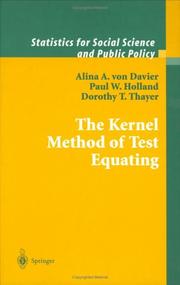
ISBN: 1280189037 9786610189038 0387217193 0387019855 Year: 2004 Publisher: New York, New York : Springer,
Abstract | Keywords | Export | Availability | Bookmark
 Loading...
Loading...Choose an application
- Reference Manager
- EndNote
- RefWorks (Direct export to RefWorks)
Kernel Equating (KE) is a powerful, modern and unified approach to test equating. It is based on a flexible family of equipercentile-like equating functions and contains the linear equating function as a special case. Any equipercentile equating method has five steps or parts. They are: 1) pre-smoothing; 2) estimation of the score-probabilities on the target population; 3) continuization; 4) computing and diagnosing the equating function; 5) computing the standard error of equating and related accuracy measures. KE brings these steps together in an organized whole rather than treating them as disparate problems. KE exploits pre-smoothing by fitting log-linear models to score data, and incorporates it into step 5) above. KE provides new tools for diagnosing a given equating function, and for comparing two or more equating functions in order to choose between them. In this book, KE is applied to the four major equating designs and to both Chain Equating and Post-Stratification Equating for the Non-Equivalent groups with Anchor Test Design. This book will be an important reference for several groups: (a) Statisticians and others interested in the theory behind equating methods and the use of model-based statistical methods for data smoothing in applied work; (b) Practitioners who need to equate tests—including those with these responsibilities in testing companies, state testing agencies and school districts; and (c) Instructors in psychometric and measurement programs. The authors assume some familiarity with linear and equipercentile test equating, and with matrix algebra. Alina von Davier is an Associate Research Scientist in the Center for Statistical Theory and Practice, at Educational Testing Service. She has been a research collaborator at the Universities of Trier, Magdeburg, and Kiel, an assistant professor at the Politechnical University of Bucharest and a research scientist at the Institute for Psychology in Bucharest. Paul Holland holds the Frederic M. Lord Chair in Measurement and Statistics at Educational Testing Service. He held faculty positions in the Graduate School of Education, University of California, Berkeley and the Harvard Department of Statistics. He is a Fellow of the American Statistical Association, the Institute of Mathematical Statistics, and the American Association for the Advancement of Science. He is an elected Member of the International Statistical Institute and a past president of the Psychometric society. He was awarded the (AERA/ACT) E. F. Lindquist Award, in 2000, and was designated a National Associate of the National Academies of Science in 2002. Dorothy Thayer currently is a consultant in the Center of Statistical Theory and Practice, at Educational Testing Service. Her research interests include computational and statistical methodology, empirical Bayes techniques, missing data procedures and exploratory data analysis techniques.
Examinations --- Educational tests and measurements --- Scoring. --- Interpretation. --- Design and construction. --- Standards. --- Econometrics. --- Statistics. --- Educational tests and measuremen. --- Psychometrics. --- Statistics for Social Sciences, Humanities, Law. --- Assessment, Testing and Evaluation. --- Statistics . --- Assessment. --- Measurement, Mental --- Measurement, Psychological --- Psychological measurement --- Psychological scaling --- Psychological statistics --- Psychology --- Psychometry (Psychophysics) --- Scaling, Psychological --- Psychological tests --- Scaling (Social sciences) --- Statistical analysis --- Statistical data --- Statistical methods --- Statistical science --- Mathematics --- Econometrics --- Economics, Mathematical --- Statistics --- Measurement --- Scaling --- Methodology --- Educational assessment --- Educational measurements --- Mental tests --- Tests and measurements in education --- Psychological tests for children --- Psychometrics --- Students --- Test construction --- Test design --- Interpretation of examinations --- Test interpretation --- Test results --- Remote scoring of examinations --- Scoring of examinations --- Self-scoring of examinations --- Test scoring --- Rating of --- Validity
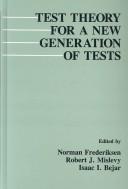
ISBN: 0805805931 Year: 1993 Publisher: Hillsdale Erlbaum
Abstract | Keywords | Export | Availability | Bookmark
 Loading...
Loading...Choose an application
- Reference Manager
- EndNote
- RefWorks (Direct export to RefWorks)
Ability --- Educational tests and measurements --- Examinations --- Aptitude --- Tests et mesures en éducation --- Examens --- Testing --- Design and construction --- Interpretation --- Tests --- Elaboration --- Interprétation des résultats --- 159.9 --- -Educational tests and measurements --- -Examinations --- -Competitive examinations --- Questions and answers --- Educational assessment --- Educational measurements --- Mental tests --- Tests and measurements in education --- Psychological tests for children --- Psychometrics --- Students --- Psychological tests --- Abilities --- Proficiency --- Skill --- Skills --- Talent --- Talents --- Expertise --- Psychologie: zie ook: Psychiatrie: n-{616.89-008} en n-{615.851} --- Rating of --- -Psychologie: zie ook: Psychiatrie: n-{616.89-008} en n-{615.851} --- 159.9 Psychologie --- 159.9 Psychologie: zie ook: Psychiatrie: n-{616.89-008} en n-{615.851} --- Psychologie --- -Educational assessment --- Competitive examinations --- Tests et mesures en éducation --- Interprétation des résultats --- Interpretation of examinations --- Test interpretation --- Test results --- Test construction --- Test design --- Ability testing --- Aptitude tests --- Testing, Ability --- Validity --- 159.9 Psychology --- Psychology
Book
ISBN: 1493903160 1493903179 Year: 2014 Publisher: New York, NY : Springer New York : Imprint: Springer,
Abstract | Keywords | Export | Availability | Bookmark
 Loading...
Loading...Choose an application
- Reference Manager
- EndNote
- RefWorks (Direct export to RefWorks)
This book provides an introduction to test equating, scaling, and linking, including those concepts and practical issues that are critical for developers and all other testing professionals. In addition to statistical procedures, successful equating, scaling, and linking involves many aspects of testing, including procedures to develop tests, to administer and score tests, and to interpret scores earned on tests. Test equating methods are used with many standardized tests in education and psychology to ensure that scores from multiple test forms can be used interchangeably. Test scaling is the process of developing score scales that are used when scores on standardized tests are reported. In test linking, scores from two or more tests are related to one another. Linking has received much recent attention, due largely to investigations of linking similarly named tests from different test publishers or tests constructed for different purposes. In recent years, researchers from the education, psychology, and statistics communities have contributed to the rapidly growing statistical and psychometric methodologies used in test equating, scaling, and linking. In addition to the literature covered in previous editions, this new edition presents coverage of significant recent research. In order to assist researchers, advanced graduate students and testing professionals, examples are used frequently, and conceptual issues are stressed. New material includes model determination in log-linear smoothing, in-depth presentation of chained linear and equipercentile equating, equating criteria, test scoring, and a new section on scores for mixed-format tests. In the third edition, each chapter contains a reference list, rather than having a single reference list at the end of the volume The themes of the third edition include: * the purposes of equating, scaling and linking and their practical context * data collection designs * statistical methodology * designing reasonable and useful equating, scaling, and linking studies * importance of test development and quality control processes to equating * equating error, and the underlying statistical assumptions for equating.
Examinations -- Interpretation. --- Examinations -- Scoring. --- Examinations --Design and construction. --- Mathematical statistics. --- Psychological tests --Standards. --- Examinations --- Psychological tests --- Educational tests and measurements --- Education --- Social Sciences --- Theory & Practice of Education --- Scoring --- Interpretation --- Design and construction --- Standards --- Scoring. --- Interpretation. --- Design and construction. --- Standards. --- Educational assessment --- Educational measurements --- Mental tests --- Tests and measurements in education --- Psychological assessment --- Tests, Psychological --- Test construction --- Test design --- Interpretation of examinations --- Test interpretation --- Test results --- Remote scoring of examinations --- Scoring of examinations --- Self-scoring of examinations --- Test scoring --- Statistics. --- Assessment. --- Psychometrics. --- Statistics for Social Science, Behavorial Science, Education, Public Policy, and Law. --- Assessment, Testing and Evaluation. --- Statistics for Social Science, Behavioral Science, Education, Public Policy, and Law. --- Measurement, Mental --- Measurement, Psychological --- Psychological measurement --- Psychological scaling --- Psychological statistics --- Psychology --- Psychometry (Psychophysics) --- Scaling, Psychological --- Scaling (Social sciences) --- Statistical analysis --- Statistical data --- Statistical methods --- Statistical science --- Mathematics --- Econometrics --- Measurement --- Scaling --- Methodology --- Psychological tests for children --- Psychometrics --- Students --- Testing --- Clinical psychology --- Rating of --- Validity --- Educational tests and measuremen. --- Statistics for Social Sciences, Humanities, Law. --- Statistics .
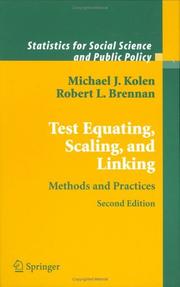
ISBN: 0387400869 9780387400860 1441923047 1475743106 Year: 2004 Publisher: New York Springer
Abstract | Keywords | Export | Availability | Bookmark
 Loading...
Loading...Choose an application
- Reference Manager
- EndNote
- RefWorks (Direct export to RefWorks)
Test equating methods are used with many standardized tests in education and psychology to ensure that scores from multiple test forms can be used interchangeably. In recent years, researchers from the education, psychology, and statistics communities have contributed to the rapidly growing statistical and psychometric methodologies used in test equating. This book provides an introduction to test equating which both discusses the most frequently used equating methodologies and covers many of the practical issues involved. This second edition expands upon the coverage of the first edition by providing a new chapter on test scaling and a second on test linking. Test scaling is the process of developing score scales that are used when scores on standardized tests are reported. In test linking, scores from two or more tests are related to one another. Linking has received much recent attention, due largely to investigations of linking similarly named tests from different test publishers or tests constructed for different purposes. The expanded coverage in the second edition also includes methodology for using polytomous item response theory in equating. The themes of the second edition include: * the purposes of equating, scaling and linking and their practical context * data collection designs * statistical methodology * designing reasonable and useful equating, scaling, and linking studies * importance of test development and quality control processes to equating * equating error, and the underlying statistical assumptions for equating Michael J. Kolen is a Professor of Educational Measurement at the University of Iowa. Robert L. Brennan is E. F. Lindquist Chair in Measurement and Testing and Director of the Center for Advanced Studies in Measurement and Assessment at the University of Iowa. Both authors are acknowledged experts on test equating, scaling, and linking, they have authored numerous publications on these subjects, and they have taught many workshops and courses on equating. Both authors have been President of the National Council on Measurement in Education (NCME), and both received an NCME award for Outstanding Technical Contributions to Educational Measurement following publication of the first edition of this book. Professor Brennan received an NCME award for Career Contributions to Educational Measurement and authored Generalizability Theory published by Springer-Verlag. .
Educational tests and measurements --- Examinations --- Psychological tests --- Methoden en technieken --- Standards. --- Design and construction. --- Interpretation. --- Scoring. --- statistiek --- statistiek. --- Mental tests --- Psychological assessment --- Tests, Psychological --- Psychology --- Testing --- Clinical psychology --- Remote scoring of examinations --- Scoring of examinations --- Self-scoring of examinations --- Test scoring --- Interpretation of examinations --- Test interpretation --- Test results --- Test construction --- Test design --- Educational assessment --- Educational measurements --- Tests and measurements in education --- Psychological tests for children --- Psychometrics --- Students --- Standards --- Design and construction --- Interpretation --- Scoring --- Methodology --- Validity --- Rating of --- Statistics . --- Assessment. --- Psychometrics. --- Statistics for Social Sciences, Humanities, Law. --- Assessment, Testing and Evaluation. --- Measurement, Mental --- Measurement, Psychological --- Psychological measurement --- Psychological scaling --- Psychological statistics --- Psychometry (Psychophysics) --- Scaling, Psychological --- Scaling (Social sciences) --- Statistical analysis --- Statistical data --- Statistical methods --- Statistical science --- Mathematics --- Econometrics --- Measurement --- Scaling
Book
ISBN: 3319518240 3319518224 Year: 2017 Publisher: Cham : Springer International Publishing : Imprint: Springer,
Abstract | Keywords | Export | Availability | Bookmark
 Loading...
Loading...Choose an application
- Reference Manager
- EndNote
- RefWorks (Direct export to RefWorks)
This book describes how to use test equating methods in practice. The non-commercial software R is used throughout the book to illustrate how to perform different equating methods when scores data are collected under different data collection designs, such as equivalent groups design, single group design, counterbalanced design and non equivalent groups with anchor test design. The R packages equate, kequate and SNSequate, among others, are used to practically illustrate the different methods, while simulated and real data sets illustrate how the methods are conducted with the program R. The book covers traditional equating methods including, mean and linear equating, frequency estimation equating and chain equating, as well as modern equating methods such as kernel equating, local equating and combinations of these. It also offers chapters on observed and true score item response theory equating and discusses recent developments within the equating field. More specifically it covers the issue of including covariates within the equating process, the use of different kernels and ways of selecting bandwidths in kernel equating, and the Bayesian nonparametric estimation of equating functions. It also illustrates how to evaluate equating in practice using simulation and different equating specific measures such as the standard error of equating, percent relative error, different that matters and others.
Examinations --- Educational tests and measurements --- Scoring. --- Interpretation. --- Standards. --- Educational assessment --- Educational measurements --- Mental tests --- Tests and measurements in education --- Interpretation of examinations --- Test interpretation --- Test results --- Remote scoring of examinations --- Scoring of examinations --- Self-scoring of examinations --- Test scoring --- Education. --- Assessment. --- Statistics. --- Psychometrics. --- Assessment, Testing and Evaluation. --- Statistics for Social Science, Behavorial Science, Education, Public Policy, and Law. --- Psychological tests for children --- Psychometrics --- Students --- Psychological tests --- Rating of --- Validity --- Educational tests and measuremen. --- Statistics for Social Sciences, Humanities, Law. --- Statistical analysis --- Statistical data --- Statistical methods --- Statistical science --- Mathematics --- Econometrics --- Measurement, Mental --- Measurement, Psychological --- Psychological measurement --- Psychological scaling --- Psychological statistics --- Psychology --- Psychometry (Psychophysics) --- Scaling, Psychological --- Scaling (Social sciences) --- Measurement --- Scaling --- Methodology --- Statistics . --- R (Computer program language). --- GNU-S (Computer program language) --- Domain-specific programming languages --- Educational tests and measurements. --- Social sciences --- Assessment and Testing. --- Statistics in Social Sciences, Humanities, Law, Education, Behavorial Sciences, Public Policy. --- Statistical methods.
| Listing 1 - 10 of 11 | << page >> |
Sort by
|

 Search
Search Feedback
Feedback About UniCat
About UniCat  Help
Help News
News